
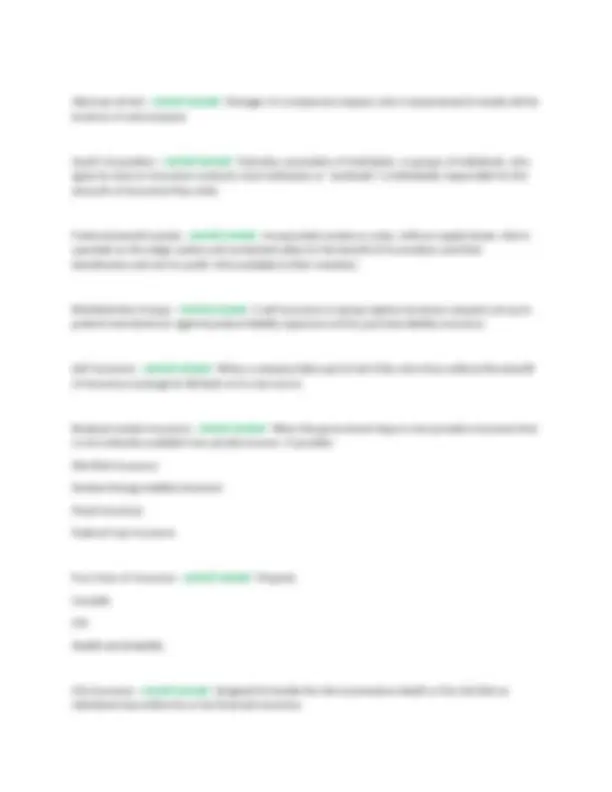
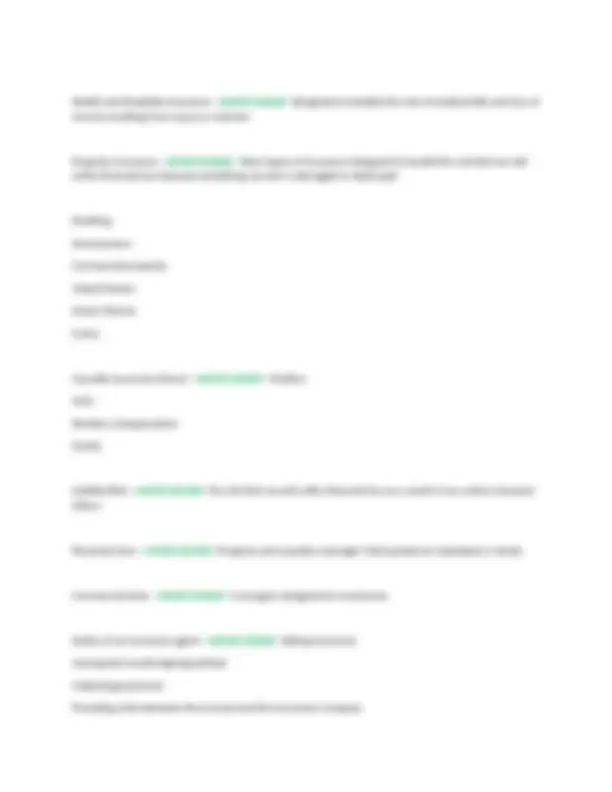
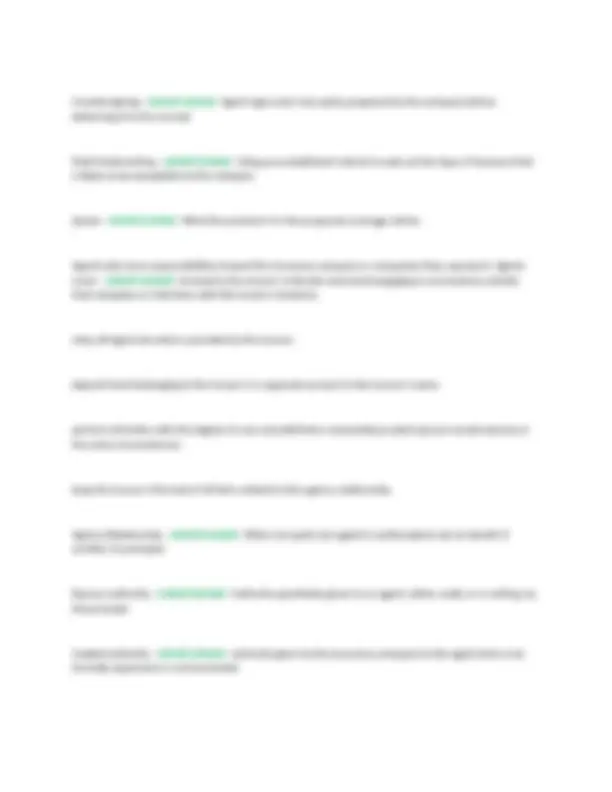
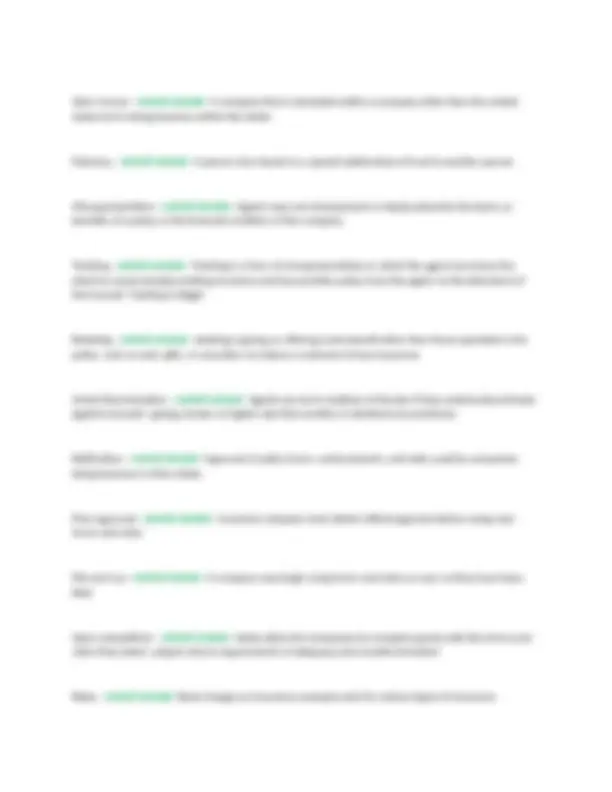
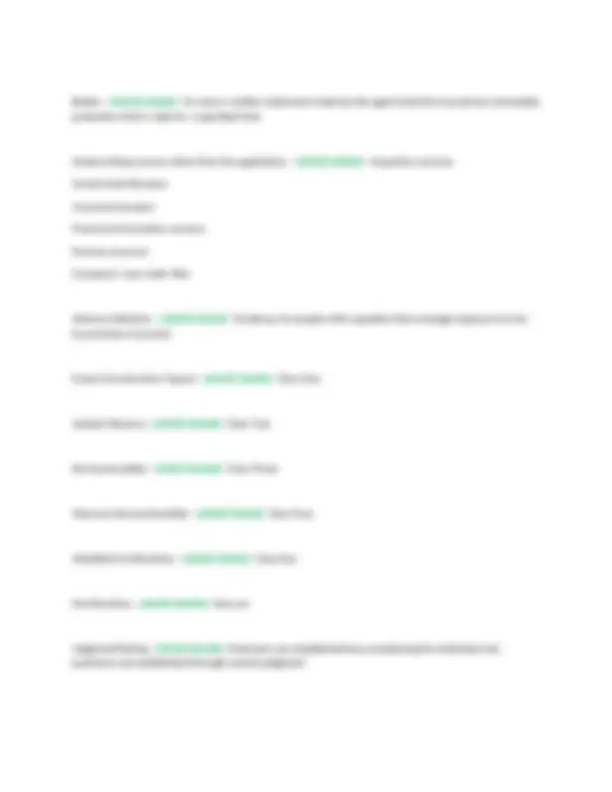
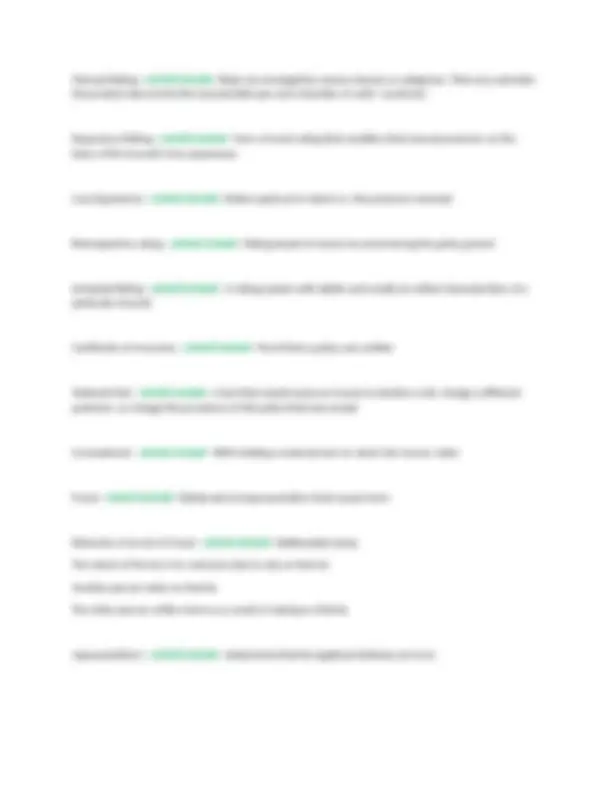
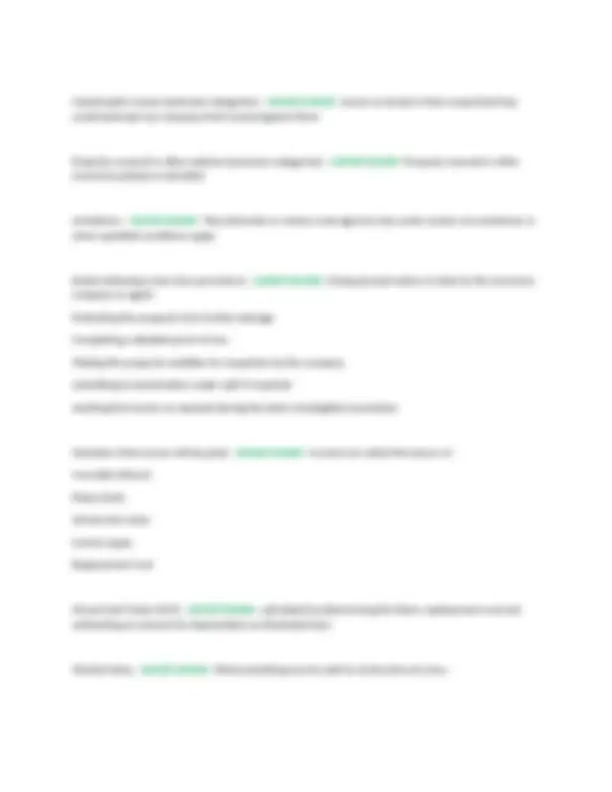
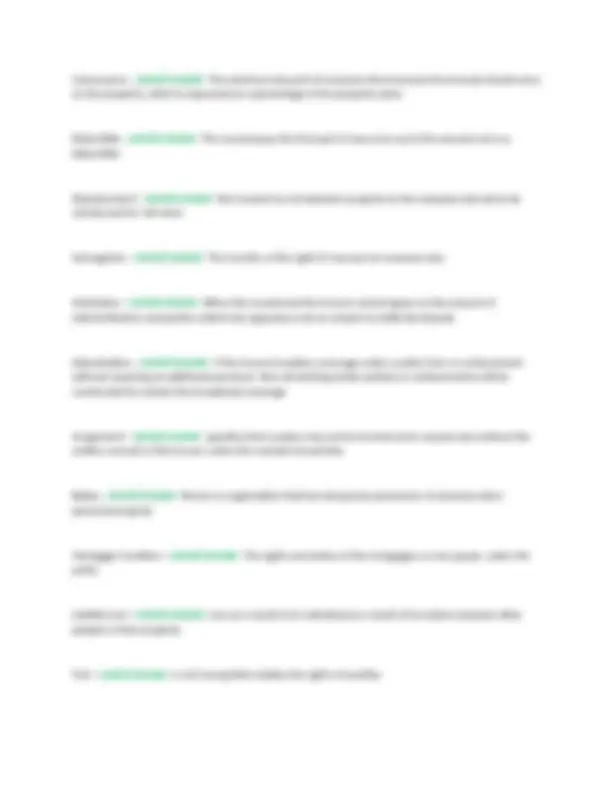
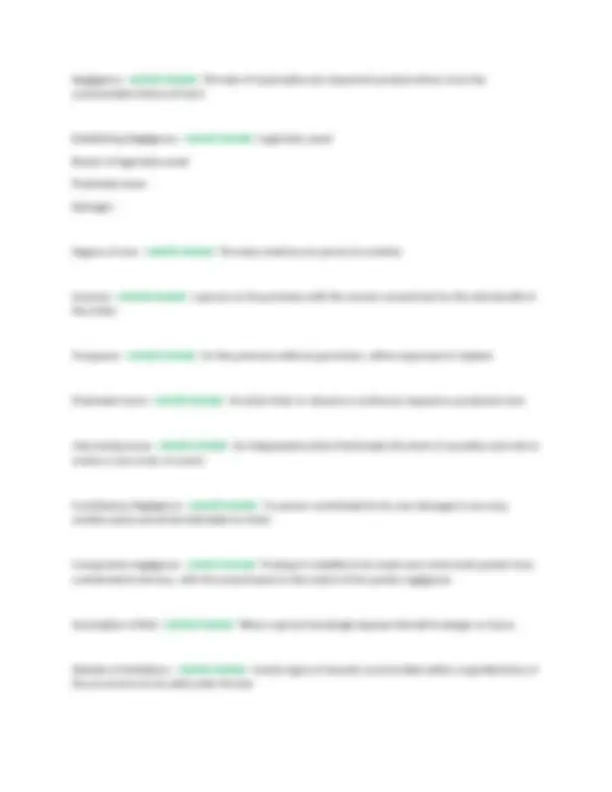
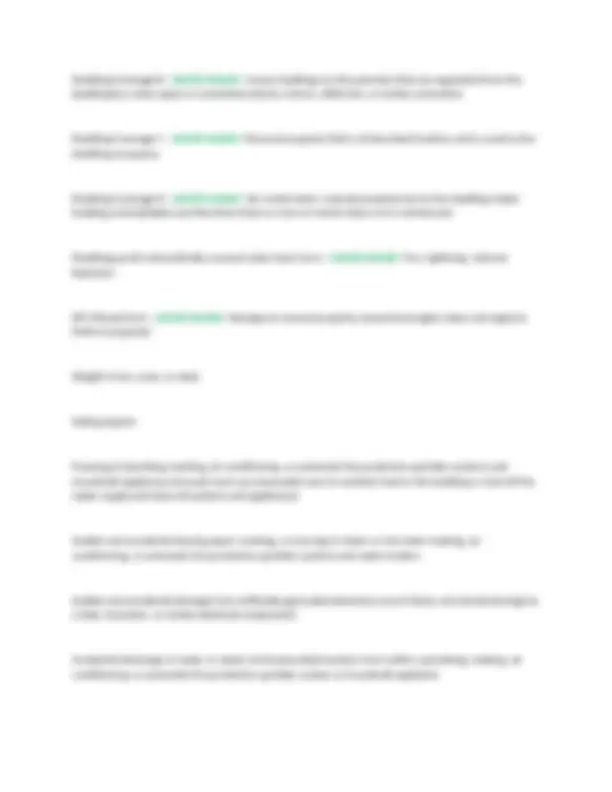
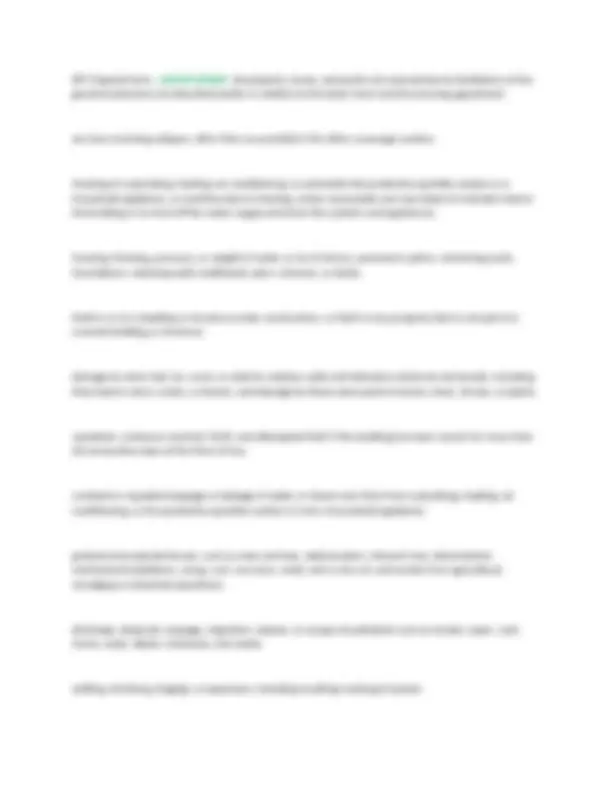
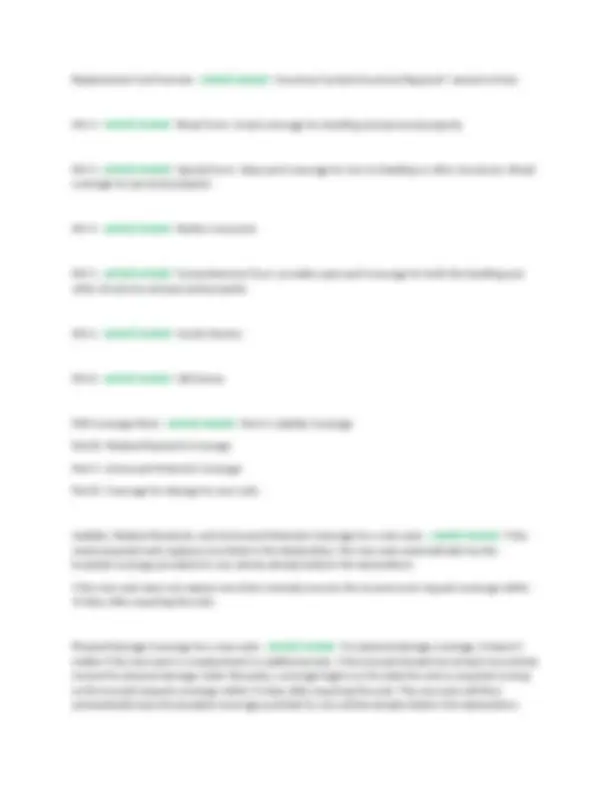
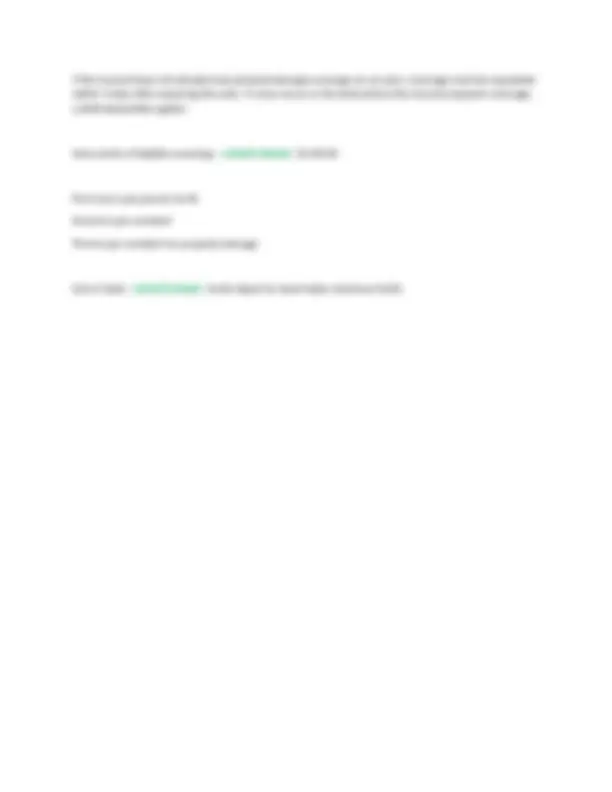


Study with the several resources on Docsity

Earn points by helping other students or get them with a premium plan


Prepare for your exams
Study with the several resources on Docsity

Earn points to download
Earn points by helping other students or get them with a premium plan
Community
Ask the community for help and clear up your study doubts
Discover the best universities in your country according to Docsity users
Free resources
Download our free guides on studying techniques, anxiety management strategies, and thesis advice from Docsity tutors
North Carolina Property and Casualty Exam Terms
Typology: Exams
1 / 21

This page cannot be seen from the preview
Don't miss anything!














Contract - correct answer A legal agreement between two competent parties that promises a certain performance in exchange for a certain consideration Contracts must exhibit: - correct answer Competent parties Legal Purpose Offer and Acceptance Consideration Principle of indemnity - correct answer When a loss occurs, an individual should be restored to the approximate financial condition he was in before the loss, no more or no less Aleatory - correct answer A contract contingent on an uncertain event (A loss) that provides for unequal transfer of value between two paries Adhesion (Contracts) - correct answer One party has greater power over the other party in drafting the contract Unilateral (Contracts) - correct answer One Sided; Only the insurance company is legally bound to perform its part of the agreement Contract of utmost good faith (Contracts) - correct answer The truthfulness and integrity of the applicant when providing information that leads to issuing a policy. Conditional (Contracts) - correct answer A number of conditions that both the insured and the insurer most follow by in order to keep the contract valid Five parts of an insurance contract - correct answer Declarations Insuring Agreements
Conditions Exclusions Definitions Declarations (Contain) - correct answer Name of Insured Address Amount of Coverage Description of Property Perils covered Insuring Agreements (Contain) - correct answer Losses for which the insured will be indemnified What is covered What perils covered Conditions (Contain) - correct answer Responsibilities and obligations for both the insurance company and the insured Exclusions (Contain) - correct answer Losses for which the insured is not covered Definitions - correct answer Meaning of certain terms used in the policy Stock Company (Types of Insurance Companies) - correct answer Sells stock to raise money to operate the business, profits are returned to stock holders, not the insureds Mutual Company (Types of Insurance Companies) - correct answer Insureds are also owners of the company, profits are returned as dividends or discounts off future payments Reciprocal Company (Types of Insurance Companies) - correct answer A unincorporated group forms together and agrees to share the insurance responsibly with all other members. Each insurers each other and share the losses with each other
Health and Disability insurance - correct answer Designed to handled the risk of medical bills and loss of income resulting from injury or sickness Property Insurance - correct answer Many types of insurance designed to handle the risk that we will suffer financial loss because something we own is damaged or destroyed Dwelling Homeowners Commercial property Inland Marine Ocean Marine Crime Casualty insurance (Lines) - correct answer Aviation Auto Workers Compensation Surety Liability Risk - correct answer the risk that we will suffer financial loss as a result of our actions towards others Personal Lines - correct answer Property and casualty coverage's that protect an individual or family Commercial lines - correct answer Coverage's designed for businesses Duties of an insurance agent - correct answer Selling insurance Issuing and countersigning policies Collecting premiums Providing a link between the insured and the insurance company
Countersigning - correct answer Agent signs each new policy prepared by the company before delivering it to the insured Field Underwriting - correct answer Using pre-established criteria to seek out the type of business that is likely to be acceptable to the company Quote - correct answer What the premium for the proposed coverage will be Agents also have responsibilities toward the insurance company or companies they represent. Agents must: - correct answer be loyal to the insurer's interests and avoid engaging in any business activity that competes or interferes with the insurer's business; obey all legal instructions provided by the insurer; deposit funds belonging to the insurer in a separate account in the insurer's name; perform all duties with the degree of care and skill that a reasonably prudent person would exercise in the same circumstances; keep the insurer informed of all facts related to the agency relationship. Agency Relationship - correct answer When one party (an agent) is authorized to act on behalf of another (A principal) Express authority - correct answer Authority specifically given to an agent, either orally or in writing, by the principal Implied authority - correct answer authority given by the insurance company to the agent that is not formally expressed or communicated
Expense ratio = underwriting expenses/ written premium Combined Ratio - correct answer Loss Ratio+Expense Ratio Underwriting - correct answer The process of selecting certain types of risks and rejecting others so the insurance company will have a book of business that will produce the companies desired results Claims - correct answer used to inspect a loss, determine whether there is coverage for the loss, estimate indemnification, and in some cases pay for the loss immediately Actuarial - correct answer Use data to determine rates for various types of insurance State insurance department - correct answer each state has an insurance department headed by an official charged with the responsibility for controlling insurance matters within that state North Carolina Commissioner is named - correct answer Wayne Goodwin NAIC (National Association of Insurance Commissioners) - correct answer A national organization that is made up of all the states commissioners and makes recommendations for the states insurance markets, non of which are binding Admitted/Authorized Insurer - correct answer A company that meets the insurance departments standards and is authorized to do business in a state Non-admitted/unauthorized insurer - correct answer Not authorized to do business in a state and may only do so under special circumstances Domestic Insurer - correct answer A company's status within the sate it is domiciled Foreign Insurer - correct answer A company's status within states other then where it is domiciled
Alien Insurer - correct answer A company that is domiciled within a company other then the united states but is doing business within the states Fiduciary - correct answer A person who stands in a special relationship of trust to another person. Misrepresentation - correct answer Agents may not misrepresent or falsely advertise the terms or benefits of a policy or the financial condition of the company Twisting - correct answer Twisting is a form of misrepresentation in which the agent convinces the client to cancel already-existing insurance and buy another policy from the agent, to the detriment of the insured. Twisting is illegal Rebating - correct answer rebating is giving or offering some benefit other than those specified in the policy, such as cash, gifts, or securities, to induce a customer to buy insurance. Unfair Discrimination - correct answer Agents can be in violation of the law if they unfairly discriminate against insured's, giving a lower or higher rate than another in identical circumstances Ratification - correct answer Approval of policy forms, endorsements, and rates used by companies doing business in their states Prior approval - correct answer Insurance company must obtain official approval before using new forms and rates File and use - correct answer A company may begin using forms and rates as soon as they have been filed Open competition - correct answer states allow the companies to compete openly with the forms and rates they select, subject only to requirements of adequacy and nondiscrimination Rates - correct answer Basic charges an insurance company sets for various types of insurance
Manual Rating - correct answer Rates are arranged by various classes or categories; Then you calculate the printed rate and do the formula Rate per unit x Number of units = premium Experience Rating - correct answer form of merit rating that modifies that manual premium on the basis of the insured's loss experience Loss Experience - correct answer Dollars paid out in claims vs. the premium received Retrospective rating - correct answer Rating based on losses incurred during the policy period Schedule Rating - correct answer A rating system with debits and credits to reflect characteristics of a particular insured Certificate of Insurance - correct answer Proof that a policy was written Material Fact - correct answer a fact that would cause an insurer to decline a risk, charge a different premium, or change the provisions of the policy that was issued Concealment - correct answer With-holding a material fact on which the insurer relies Fraud - correct answer Deliberate misrepresentation that causes harm Elements of an act of Fraud - correct answer Deliberately Lying The intent of the lie is for someone else to rely on that lie Another person relies on that lie The other person suffers harm as a result of relying on that lie representations - correct answer statements that the applicant believes are true
Warranties - correct answer An agreement between the insured and insurer that certain conditions will be met estopped - correct answer If an insurance company representative intentionally or unintentionally creates the impression that a certain fact exists when it does not, and an innocent part relies on that impression and is damaged as a result the company will be ___________ from denying this fact Policy Term - correct answer Time between the effective date and the expiration date Insured (Cancellation) - correct answer may cancel the policy by writing a letter to the insurance company or by surrendering the policy to the company Unearned Premium - correct answer Any premium that is not yet "used up" during the policy period Short Rate Basis - correct answer Whenthe insured cancels before the expiration date, the company nor only keeps the premium for insurance already provided but also keeps an allowance for expenses, such as issuing the policy Pro Rata Basis - correct answer Company retains only the earned premium and is not permitted to keep an extra amount for expenses Flat Cancellation - correct answer When a policy is canceled by either the insured or the insurance company on its effective date Insurance Services Office (ISO) - correct answer An institute that provides a standard form of applications for insurance companies Named Insured - correct answer The person, business, or other entity named in the declarations to whom the policy is issued First named insured - correct answer Person listed first on the declarations page
Catastrophic Losses (exclusion categories) - correct answer Losses so broad in their scope that they could bankrupt any company that insured against them Property covered in other policies (exclusion categories) - correct answer Property covered in other insurance policies is excluded Limitations - correct answer May eliminate or reduce coverage but only under certain circumstances or when specified conditions apply Duties following a loss (loss provisions) - correct answer Giving prompt notice of claim to the insurance company or agent Protecting the property from further damage Completing a detailed proof of loss Making the property available for inspection by the company submitting to examination under oath if required assisting the insurer as required during the claim investigation procedure Valuation (How losses will be paid) - correct answer Insured can collect the lessor of ; Insurable interest Policy limits Actual cash value Cost to repair Replacement Cost Actual Cash Value (ACV) - correct answer calculated by determining the items replacement cost and subtracting an amount for depreciation as illustrated here Market Value - correct answer What something can be sold for at the time of a loss
Coinsurance - correct answer The minimum amount of insurance the insurance the insured should carry on the property, which is expressed as a percentage of the property value Deductible - correct answer The insured pays the first part of every loss up to the amount set as a deductible Abandonment - correct answer the insured my not abandon property to the company and ask to be reimbursed for full value Subrogation - correct answer The transfer of the right of recovery to someone else Arbitration - correct answer When the insured and the insurer cannot agree on the amount of indemnification and parties collect two appraisers and an umpire to settle the dispute Liberalization - correct answer If the insurer broadens coverage under a policy form or endorsement without requiring an additional premium, then all existing similar policies or endorsements will be constructed to contain the broadened coverage Assignment - correct answer specifies that a policy may not be transferred to anyone else without the written consent of the insurer unless the named insured dies Bailee - correct answer Person or organization that has temporary possession of someone else's personal property Mortgage Condition - correct answer The rights and duties of the mortgagee, or loss payee, under the policy Liability Loss - correct answer Loss as a result of an individual as a result of his actions towards other people or their property Tort - correct answer A civil wrong that violates the rights of another
Absolute Liability (Strict Liability) - correct answer When an individual is involved in operations that are considered especially hazardous they may be held liable for the damages of another even though they were not negligent Vicarious Liability - correct answer When a person is responsible for the negligent acts of another person Parties of a loss - correct answer 1st party is insured Company legally representing or defending is 2nd 3rd party is the person who suffered the injury Compensatory damages - correct answer Reimburse the injured party only for losses that were actually sustained Special Damages - correct answer all direct and specific expenses involved in a particular loss, such as medical expenses, lost wages, funeral expenses, cost to replace and repair property General Damages - correct answer compensate for pain and suffering and disfigurement... such as mental anguish and loss of companionship Punitive Damages - correct answer damages intended to punish the defendant and make an example of him to discourage other from behaving the same way Bodily Injury (BI) - correct answer Injury, sickness, disease, and death arising out of injury, sickness, or disease. Property Damage (PD) - correct answer damage or destruction of property, including loss of use of the property Personal Injury (PI) - correct answer Slander, libel, false arrest, and invasion of privacy Defense costs for liability claims - correct answer In addition to policy limits
Supplementary Payments - correct answer Payments made in addition to the policy's regular limit of liability -Defense Costs -Expenses incurred in the investigation of a claim -Premiums for certain types of bonds, such as bail bonds, appeal bonds, and release of attachment bonds -First aid to others at the time of an accident -reasonable expenses incurred by the insured at the company's request in the investigation or defense of a claim -Loss of earnings -Prejudgment Interest -Post judgment Interest Per Occurrence - correct answer A loss occurs at a specific time or place, claims made individually on these Aggregate limit - correct answer Maximum amount of coverage for a policy within the policy period, can be used up Dwelling policy - correct answer provides protection for individuals and families against loss to their dwelling and personal property DP-1 Basic Dwelling policy form - correct answer Dwelling, other structures, personal property, fair rental value Dwelling Coverage A - correct answer covers the dwelling, structures attached to the dwelling, materials and supplies for use in the construction or repair of the dwelling or other structures on the location, and building or outdoor equipment used to service the premises
DP-3 Special form - correct answer all property, losses, and perils not covered due to limitations of the general exclusions (as described earlier in relation to the basic form) and the insuring agreement; any loss involving collapse, other than as provided in the other coverages section; freezing of a plumbing, heating, air conditioning, or automatic fire protective sprinkler system or a household appliance, or overflow due to freezing, unless reasonable care was taken to maintain heat in the building or to shut off the water supply and drain the systems and appliances; freezing, thawing, pressure, or weight of water or ice to fences, pavement, patios, swimming pools, foundations, retaining walls, bulkheads, piers, wharves, or docks; theft in or to a dwelling or structure under construction, or theft of any property that is not part of a covered building or structure; damage by wind, hail, ice, snow, or sleet to outdoor radio and television antennas and aerials, including their lead-in wires, masts, or towers, and damage by these same perils to lawns, trees, shrubs, or plants; vandalism, malicious mischief, theft, and attempted theft if the dwelling has been vacant for more than 60 consecutive days at the time of loss; constant or repeated seepage or leakage of water or steam over time from a plumbing, heating, air conditioning, or fire protective sprinkler system or from a household appliance; gradual and expected losses, such as wear and tear, deterioration, inherent vice, latent defect, mechanical breakdown, smog, rust, corrosion, mold, wet or dry rot, and smoke from agricultural smudging or industrial operations; discharge, dispersal, seepage, migration, release, or escape of pollutants such as smoke, vapor, soot, fumes, acids, alkalis, chemicals, and waste; settling, shrinking, bulging, or expansion, including resulting cracking of pavem
Replacement Cost Formula - correct answer Insurance Carried/Insurance Required* amount of loss HO-2 - correct answer Broad Form- broad coverage for dwelling and personal property HO-3 - correct answer Special Form- Open peril coverage for loss to dwelling or other structures. Broad coverage for personal property HO-4 - correct answer Renters insurance HO-5 - correct answer Comprehensive Form- provides open peril coverage for both the dwelling and other structures and personal property HO-6 - correct answer Condo Owners HO-8 - correct answer Old homes PAP Coverage Parts - correct answer Part A- Liability Coverage Part B- Medical Payments Coverage Part C- Uninsured Motorists Coverage Part D- Coverage for damage to your auto Liability, Medical Payments, and Uninsured Motorists Coverage for a new auto - correct answer If the newly acquired auto replaces one listed in the declarations, the new auto automatically has the broadest coverage provided for any vehicle already listed in the declarations. If the new auto does not replace one that is already insured, the insured must request coverage within 14 days after acquiring the auto. Physical Damage Coverage for a new auto - correct answer For physical damage coverage, it doesn't matter if the new auto is a replacement or additional auto. If the insured already has at least one vehicle insured for physical damage under the policy, coverage begins on the date the auto is acquired as long as the insured requests coverage within 14 days after acquiring the auto. The new auto will then automatically have the broadest coverage provided for any vehicle already listed in the declarations.